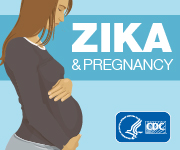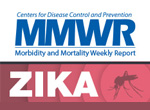Updated Interim Zika Clinical Guidance for Pregnant Women and Data on Contraceptive Use to Decrease Zika-affected Pregnancies
Date:Tuesday, August 9, 2016
Presenter(s)
Charlan D. Kroelinger, PhD, MA
Team Lead
Division of Reproductive Health
National Center for Chronic Disease Prevention and Health Promotion
Centers for Disease Control and Prevention
Erin Berry-Bibee, MD, MPH
Guest Researcher/ Assistant Professor
Division of Reproductive Health
Centers for Disease Control and Prevention
Department of Obstetrics and Gynecology
University of North Carolina Chapel Hill
Titilope Oduyebo, MD, MPH
Medical Officer
Division of Reproductive Health
National Center for Chronic Disease Prevention and Health Promotion
Centers for Disease Control and Prevention
Overview
CDC’s top priority for the Zika response is to protect pregnant women and their fetuses from the adverse effects of Zika virus infection in pregnancy. As a result, CDC continues to evaluate all available evidence and update recommendations as new information becomes available. CDC has updated its interim guidance for U.S. healthcare providers caring for pregnant women with possible Zika virus exposure based on emerging evidence about laboratory testing for the diagnosis of Zika. A primary strategy to reduce Zika-related pregnancy complications is to prevent pregnancy among women who want to delay or avoid pregnancy. CDC published contraceptive use data for states where mosquito-borne transmission of Zika is possible. During this COCA Call, clinicians will learn about the updated CDC interim guidance for caring for pregnant women with possible Zika virus exposure, and strategies for increasing access to contraceptive methods and services to minimize the number of pregnancies affected by Zika.
Objectives
- Discuss revised diagnostic testing for Zika virus infection among pregnant women.
- Discuss clinical management of pregnant women with confirmed or possible Zika virus infection.
- Review use of a range of contraceptive methods in states, with a focus on highly effective methods.
- Define strategies for increasing access and availability to highly effective contraception.
Call Materials
- Slides: Read Now
- Transcript: Read Now
- Audio: Listen Now
- Webcast: Watch Now
- Transcripción en Español: Leer Ahora
Accreditation Statements
Continuing Education
- Activity number:WCWD2286(SC)
- Date of origination:December 12, 2013
- Date of renewal:December 12, 2015
- Date of expiration:December 12, 2017
- Prerequisites:None
- To earn continuing education/contact hours
Target Audience
- Physicians
- Nurses
- Pharmacists
- Veterinarians
- Physician Assistants
- Health Educators
- Other Clinicians
Hardware/Software
Additional Information
- Contact Information:coca@cdc.gov
- Support/Funding:Centers for Disease Control and Prevention, Emergency Risk Communications Branch
- Method of Participation:You may participate in the educational activity by viewing the program information above.
- Fees:COCA continuing education credits are free.
Accreditation Statements
CME:The Centers for Disease Control and Prevention is accredited by the Accreditation Council for Continuing Medical Education (ACCME®) to provide continuing medical education for physicians.
The Centers for Disease Control and Prevention designates this live activity for a maximum of 1.0 AMA PRA Category 1 Credit™. Physicians should only claim credit commensurate with the extent of their participation in the activity.
CNE:The Centers for Disease Control and Prevention is accredited as a provider of Continuing Nursing Education by the American Nurses Credentialing Center's Commission on Accreditation.
This activity provides 1.0 contact hour.
IACET CEU:The Centers for Disease Control and Prevention is authorized by IACET to offer 1.0 CEU's for this program.
CECH:Sponsored by the Centers for Disease Control and Prevention, a designated provider of continuing education contact hours (CECH) in health education by the National Commission for Health Education Credentialing, Inc. This program is designed for Certified Health Education Specialists (CHES) and/or Master Certified Health Education Specialists (MCHES) to receive up to 1.0 total Category I continuing education contact hours. Maximum advanced level continuing education contact hours available are 0. CDC provider number 98614.
 CPE:The Centers for Disease Control and Prevention is accredited by the Accreditation Council for Pharmacy Education as a provider of continuing pharmacy education. This program is a designated event for pharmacists to receive 0.1 CEUs in pharmacy education. The Universal Activity Number is 0387-0000-16-167-L04-P and enduring 0387-0000-16-167-H04-P course category.
CPE:The Centers for Disease Control and Prevention is accredited by the Accreditation Council for Pharmacy Education as a provider of continuing pharmacy education. This program is a designated event for pharmacists to receive 0.1 CEUs in pharmacy education. The Universal Activity Number is 0387-0000-16-167-L04-P and enduring 0387-0000-16-167-H04-P course category.
Course Category: This activity has been designated as knowledge-based.
Once credit is claimed, an unofficial statement of credit is immediately available on TCEOnline. Official credit will be uploaded within 60 days on the NABP/CPE Monitor.
AAVSB/RACE:This program was reviewed and approved by the AAVSB RACE program for 1.0 hours of continuing education in the jurisdictions which recognize AAVSB RACE approval. Please contact the AAVSB RACE Program at race@aavsb.org if you have any comments/concerns regarding this program’s validity or relevancy to the veterinary profession.
CPH: The Centers for Disease Control and Prevention is a pre-approved provider of Certified in Public Health (CPH) recertification credits and is authorized to offer 1 CPH recertification credit for this program.
CDC is an approved provider of CPH Recertification Credits by the National Board of Public Health Examiners. Effective October 1, 2013, the National Board of Public Health Examiners (NBPHE) accepts continuing education units (CEU) for CPH recertification credits from CDC. Please select CEU as your choice for continuing education when registering for a course on TCEOnline. Learners seeking CPH should use the guidelines provided by the NBPHE for calculating recertification credits. For assistance please contact NBPHE at http://www.NBPHE.org.
There is no cost for this program.
DISCLOSURE: In compliance with continuing education requirements, CDC, our planners, our presenters, and their spouses/partners wish to disclose they have no financial interests or other relationships with the manufacturers of commercial products, suppliers of commercial services, or commercial supporters. Planners have reviewed content to ensure there is no bias.
The presentation will not include any discussion of the unlabeled use of a product or a product under investigational use.
CDC does not accept commercial support.
- Page last reviewed: July 26, 2016
- Page last updated: September 14, 2016
- Content source:
- Maintained By:





 ShareCompartir
ShareCompartir
 =
=